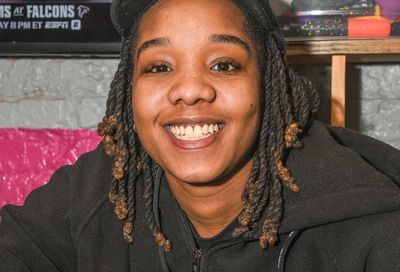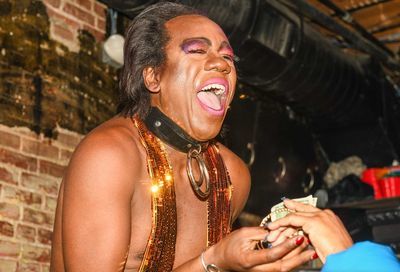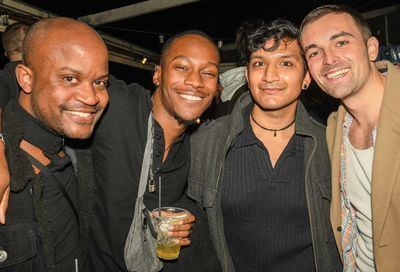Feast and Famine
Theater J's Mikvah is familiar and wonderful, while Constellation's attempt to mount an epic is an epic fail
There is something about Hadar Galron’s Mikveh that seems familiar. This would not seem so strange were it not for the fact that Theater J’s production is actually the English language, world premiere of the Israeli writer’s play. Were it not for the fact that it’s not every day (at least not in Washington) where you open a program to be informed – where the ”Time” of the play is listed – that it is Rosh Chodesh, the first day of the new month in the lunar Jewish calendar. Or that the year is 5764.

Mikveh
(Photo by Stan Barouh)
It’s not every day that Sarah Marshall wanders out as the audience is taking its seats to fold a few towels and check on the bright orange goldfish swimming slowly around its bowl onstage.
But despite how ”different” things seem to be on the surface, no matter whether the ritual bath of the mikveh is a part of your tradition or as far from your experience as you can imagine, there is something familiar here. Not comforting. But familiar.
The story of eight very different women and the manner in which their lives intersect at the mikveh (a precisely executed ritual bath in the Orthodox Jewish tradition for the purpose of restoring purity), Galron’s play is the theatrical equivalent of a chick flick. It’s Thelma and Louise meets Steel Magnolias meets Beauty Shop meets… well… something Orthodox and Jewish. That’s why it feels so familiar and what ultimately makes it enjoyable if not necessarily groundbreaking.
Shoshana (Marshall), the mikveh attendant, is finally getting some help after an accident results in the death of her former co-worker. The new attendant, Shira (Lise Bruneau), comes from outside the community and rumors about her outspoken manner arrive well before she does. To some of the women, like the immaculately put-together Hindi (Kim Schraf), Shira is a threat to the well-orchestrated silence that keeps trouble out of sight and out of mind. To others, like the troubled bride-to-be Tehila (Amal Saade) and the secular pop singer Miki (Tonya Beckman Ross) she’s a bright light in the cloistered darkness.
Marshall is perfectly wonderful in the role of Shoshana. Her measured grace and deeply nuanced performance is marked by a kind of underplaying. No large gestures. No big movements. It’s a lovely turn that ties wonderfully to the rest of the ensemble.
Bruneau gives great shape to the role of Shira, a role that could easily dissolve into a one-dimensional, liberated woman caricature. Bruneau invests her talents wisely, bringing a simple spontaneity to the stage. It’s as though the character’s life is truly unfolding before our eyes.
Mention must also be made of the performances delivered by Schraf, as a truly great bitch, and Beckman Ross, as a truly great bitch whom you’d want to go out drinking with. In the end, it’s the chemistry and connectedness of the entire ensemble of strong female actors that succeeds in making Mikveh something quite wonderful. Familiar, and wonderful.
Potluck. A word that has the ability to unnerve even the most unflappable of partygoers. In theory it’s intended to be a kind of stone soup approach to entertaining. Everyone brings something to the table – world-weary foodie and drive-thru fan alike – and soon an unbelievable feast will appear. As if by magic.

The Ramayana
The reality is that the potluck very rarely works. The person who said he would bring chicken forgets and brings brownies. The person who said she would bring dessert shows up empty-handed because she got held up at work. The only item approaching green is the plastic bag of salad someone snuck onto the table when no one was looking.
The stone soup becomes, instead, Charlie Brown’s trick-or-treat bag of rocks.
For playwright Peter Oswald’s interpretation of the Ramayana, Constellation Theatre Company tried to assemble their own eclectic feast but, instead, ended up with a rocky mix of curious pairings and odd juxtapositions. It’s as though they feared the audience’s reaction, convinced that a wholly dramatic rendering would bore them or that embracing an offbeat comedic approach would put them off. So they decided, unfortunately, to try to have their cake and eat it too.
The Ramayana is an epic journey, the story of the exiled Prince Rama (Andreu Honeycutt) and his quest to rescue his wife Sita ( Heather Haney) from the clutches of Ravana, the Demon King (Jim Jorgensen). Rama is aided in his mission by his brother Lakshman (Danny Gavigan) and a Noah’s Ark of bears and monkeys.
Leading the cast, Honeycutt and Haney are visually flawless. Beautifully outfitted by costume designer Kendra Rai and strikingly composed (this is not even to mention Honeycutt’s blue skin), the two are decidedly mythic in appearance. But their soft, even delivery and elegant poses gradually begin to feel less god-like and more disconnected. It’s an effect that is heightened as the play’s demons and animal characters press quickly into full camp. (With Jorgensen it seems only a matter of time before his evil demon king will begin twirling the ends of some spidery bad guy mustache while tying Sita to the railroad tracks.)




To June 5
Theater J
$30-$55
800-494-8497
theaterj.org
THE RAMAYANA


To June 6
Constellation Theatre
$15-$25
800-494-8497
constellationtheatre.org
Joe Brack, who plays the monkey god Hanuman, is notable in that he seems to be making an earnest attempt to bridge the two worlds this Ramayana is straddling. It’s an effort in which he largely succeeds. There is a genuine character at the heart of what he’s doing, a personality beneath the makeup and monkey tail.
But it’s a technique not picked up on by his cast mates. They screech. They howl. They hiss and mug as though they were performing a Grimm’s fairy tale for a visiting elementary school.
Make no mistake, it all might have worked. Constellation’s production includes some very funny moments, just as it presents some truly engaging dramatic elements and clever approaches. What’s missing, though, is the thread to tie it all together, something to unify all these various parts into a coherent whole, something to make these small plates into the feast they wanted to serve up.
Support Metro Weekly’s Journalism
These are challenging times for news organizations. And yet it’s crucial we stay active and provide vital resources and information to both our local readers and the world. So won’t you please take a moment and consider supporting Metro Weekly with a membership? For as little as $5 a month, you can help ensure Metro Weekly magazine and MetroWeekly.com remain free, viable resources as we provide the best, most diverse, culturally-resonant LGBTQ coverage in both the D.C. region and around the world. Memberships come with exclusive perks and discounts, your own personal digital delivery of each week’s magazine (and an archive), access to our Member's Lounge when it launches this fall, and exclusive members-only items like Metro Weekly Membership Mugs and Tote Bags! Check out all our membership levels here and please join us today!























